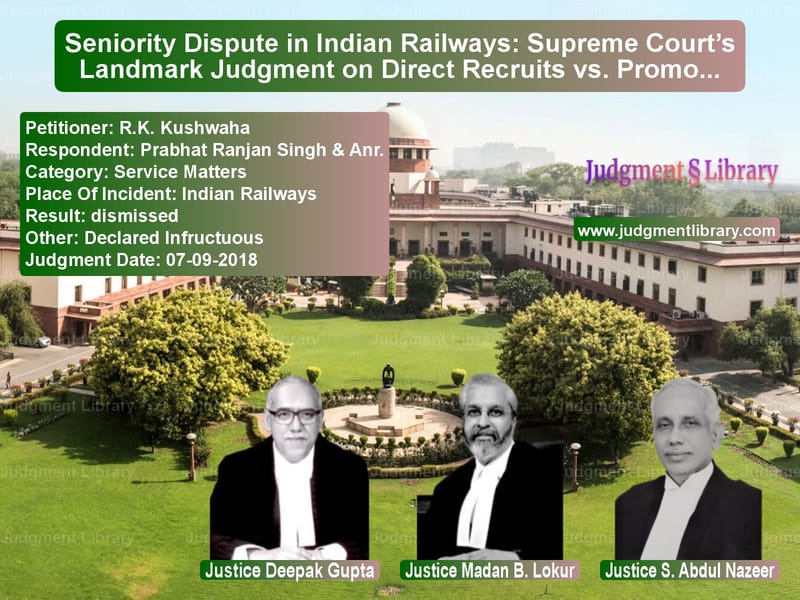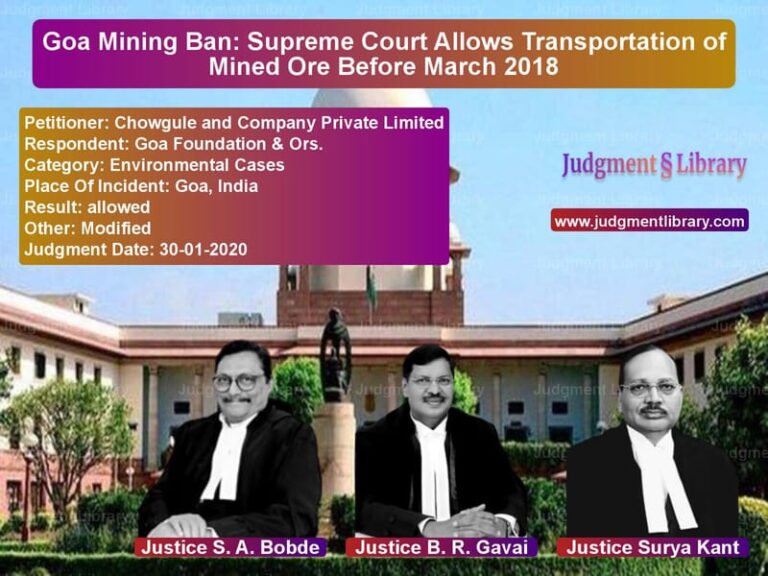Seniority Dispute in Indian Railways: Supreme Court’s Landmark Judgment on Direct Recruits vs. Promotees
The long-standing conflict between direct recruits and promotees in the Indian Railways has resulted in numerous legal disputes over seniority. This judgment by the Supreme Court, delivered on September 7, 2018, addresses the complexities involved in determining seniority between these two categories of officers in the Indian Railway Service of Signal Engineers (IRSSE), a Group-A service.
Recruitment to the IRSSE is conducted through two modes: 50% through direct recruitment, where officers are selected through the Union Public Service Commission (UPSC) examination, and 50% through promotion from Group-B officers within the feeder services. The controversy in this case arose from the Ministry of Railways’ decision to grant five years of weightage in seniority to promotee officers, effectively placing them ahead of direct recruits.
Background of the Case
The dispute began when R.K. Kushwaha, a direct recruit, challenged the seniority granted to promotees. The Ministry of Railways, in its order dated December 12, 2014, fixed the seniority of 87 promotee officers, placing them above the direct recruits of the 2008 Engineering Services Examination batch. This meant that the promotees who joined Group-A service on May 8, 2014, were deemed to have entered the service as of May 8, 2009, thereby gaining an advantage over direct recruits who had actually joined in 2009.
The petitioner, R.K. Kushwaha, approached the Central Administrative Tribunal (CAT), Patna Bench, arguing that this arrangement was unfair and violated the principles set forth in the Supreme Court’s ruling in N.R. Parmar, which had clarified the rules for fixing inter se seniority between direct recruits and promotees.
Arguments of the Petitioner
R.K. Kushwaha contended that:
- The principle of seniority should be based on the date of requisition for recruitment, as per the Department of Personnel and Training (DoPT) Office Memorandum dated March 4, 2014.
- The Railways’ decision to grant weightage to promotees effectively undermined the merit-based selection process for direct recruits.
- The promotees were assigned seniority retrospectively without adhering to the principles laid down in the N.R. Parmar ruling, which mandates that direct recruits should be granted seniority from the date of requisition.
- The Railways’ decision led to a disproportionate number of promotees being placed above direct recruits, despite the recruitment ratio being 50:50.
Arguments of the Respondents
The respondents, represented by Prabhat Ranjan Singh and others, defended the Railways’ decision by arguing:
- Seniority in the Railways is determined by the Date of Increment in the Time Scale (DITS), as per the Indian Railways Establishment Manual (IREM).
- Rule 334 of the IREM explicitly allows promotees to receive a weightage of up to five years when placed in Group-A service.
- The DoPT circular does not apply to the Railways as they operate under the Government of India’s Allocation of Business Rules, 1961, which exclude Railways from DoPT’s jurisdiction.
- The practice of granting weightage to promotees has been in existence for decades and is justified by their prior experience in handling similar responsibilities in Group-B service.
Supreme Court’s Key Observations
After considering the arguments from both sides, the Supreme Court examined the following issues:
- Whether the Railways is bound by the rules framed by the DoPT or has the autonomy to frame its own service rules.
- Whether the IREM has statutory force under Article 309 of the Constitution.
- Whether the CAT had the authority to quash the weightage system provided for promotees.
- Whether the changes introduced by the Railways, replacing DITS with a ‘year of allotment’ approach, aligned with judicial precedents.
The Court made the following key observations:
- The Railways is an autonomous entity in framing service rules for its employees and is not bound by DoPT circulars.
- The IREM is a statutory document issued under Article 309 of the Constitution and has binding force.
- The N.R. Parmar ruling does not grant automatic seniority to direct recruits from the date of requisition unless the vacancy year matches the requisition year.
- The challenge raised by R.K. Kushwaha did not specifically contest Rule 334, which provides for weightage to promotees.
Final Judgment
The Supreme Court upheld the amendments introduced by the Railways, which replaced the DITS system with the ‘year of allotment’ principle, similar to the one followed for Indian Administrative Service (IAS) officers. The Court ruled:
“The CAT had only directed that instead of ‘DITS’, the ‘year of allotment’ should be the determining factor/criteria for determining inter se seniority.”
The Court dismissed the appeal of R.K. Kushwaha, stating that the CAT had not invalidated Rule 334 and that the changes introduced by the Railways aligned with its directives. Consequently, all pending contempt petitions and applications were also dismissed.
Implications of the Judgment
The Supreme Court’s ruling has significant implications for seniority disputes in the Railways:
- It reaffirms the authority of the Railways to frame and implement its own service rules.
- It upholds the statutory nature of the IREM, reinforcing its validity in determining seniority.
- It sets a precedent that direct recruits cannot claim seniority based solely on the date of requisition unless vacancies align with that requisition year.
- It clarifies that the weightage system for promotees, which has existed for decades, remains legally valid.
The ruling provides a structured and legally sound approach to resolving disputes between direct recruits and promotees, ensuring fairness in the appointment process while maintaining the long-established principles governing the Indian Railways’ workforce.
Petitioner Name: R.K. Kushwaha.Respondent Name: Prabhat Ranjan Singh & Anr..Judgment By: Justice Deepak Gupta, Justice Madan B. Lokur, Justice S. Abdul Nazeer.Place Of Incident: Indian Railways.Judgment Date: 07-09-2018.
Don’t miss out on the full details! Download the complete judgment in PDF format below and gain valuable insights instantly!
Download Judgment: R.K. Kushwaha vs Prabhat Ranjan Singh Supreme Court of India Judgment Dated 07-09-2018.pdf
Direct Downlaod Judgment: Direct downlaod this Judgment
See all petitions in Promotion Cases
See all petitions in Recruitment Policies
See all petitions in Public Sector Employees
See all petitions in Judgment by Deepak Gupta
See all petitions in Judgment by Madan B. Lokur
See all petitions in Judgment by S. Abdul Nazeer
See all petitions in dismissed
See all petitions in Declared Infructuous
See all petitions in supreme court of India judgments September 2018
See all petitions in 2018 judgments
See all posts in Service Matters Category
See all allowed petitions in Service Matters Category
See all Dismissed petitions in Service Matters Category
See all partially allowed petitions in Service Matters Category







